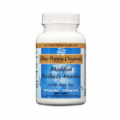Perilla & Mentha
60 capsules x 5000mg. from Blue Poppy Originals
Indications: Food allergies, hypoglycemia, irritable bowel syndrome, Crohn's disease, chronic allergic rhinitis/sinusitis, intestinal parasites, intestinal dysbiosis, candidiasis, gu parasites with abdominal distention, leaky gut syndrome, loose stools or diarrhea, abdominal cramping.
Applications in Traditional Chinese Medicine:
TCM pattern: spleen qi vacuity with stomach and intestinal dampness and heat complicated by liver depression, stomach fluid dryness, and heart qi and blood vacuity
Classical Antecedent: Su He Tang Jia Jian
The signs and symptoms of spleen qi vacuity include:
fatigue, especially after eating
easy bruising
abdominal bloating after eating
a swollen tongue with teeth marks on its edges
a tendency to loose stools but possibly constipation
cold hands and feet
a fine pulse which is often soggy or soft in the right bar position
lack of strength in the four extremities
dizziness when standing up
The signs and symptoms of stomach and intestine damp heat include:
hot, acid stools or anal burning after defecation
loose stools or diarrhea which is either very dark or bright yellow in color
foul-smelling, possibly explosive stools accompanied by tenesmus
slimy, yellow fur on the root of the tongue
a slippery, rapid pulse
The signs and symptoms of liver depression include:
premenstrual or menstrual lower
irritability
abdominal distention
a bowstring pulse
lower abdominal cramping
worsening of symptoms due to emotional stress or upsetment
premenstrual breast distention and pain
The signs and symptoms of stomach fluid dryness include:
thirst with a desire for chilled drinks
dry or scanty tongue fur
a dry mouth and throat
possible patches of peeled tongue fur
possible chapped lips
The signs and symptoms of heart qi and blood vacuity include:
insomnia
lassitude of the spirit
disquieted spirit
heart palpitations
vexation and agitation
a swollen tongue with a crack or crease down its center reaching to the tip
impaired memory
Formula explanation
Forsythia and Scutellaria clear heat and resolves toxins but without damaging the spleen. Mix-fried Licorice, Astragalus, and Codonopsis all supplement the spleen and heart qi, thus quieting the spirit by nourishing it. Dang Gui, Polygonum Multiflorum, and Peony all nourish the blood and moisten dryness, harmonizing and emolliating the liver. Pinellia harmonizes the stomach, eliminates dampness, and transforms phlegm. Poria seeps dampness at the same time as it helps supplement the heart and spleen and quiet the spirit. Ophiopogon engenders fluids, nourishes stomach, lung, and heart yin, clears heat from those same viscera and bowels, and transforms phlegm. Citrus harmonizes the stomach and downbears counterflow, thus rectifying the qi. It also aids Pinellia and Poria in eliminating dampness and transforming phlegm. Mume aids Ophiopogon in engendering fluids. However, it also has a pronounced and specific effect of killing worms or parasites. This effect seems to be strengthened even more when Mume is combined with Perilla. This is an exterior-resolver, but that classification does not begin to do justice to this often overlooked medicinal. According to gu parasite theory, Perilla has a strong gu-killing, toxin-resolving effect which should not be underestimated. Mentha is acrid and warm is also an exterior-resolver. It courses the liver, clears heat, and resolves depression. According to gu parasite theory, it also is a specific for gu conditions. Likewise, so is Angelica Dahurica. It too is an exterior-resolver which is often not fully understood or appreciated by rank and file Chinese medical practitioners. Although it is described as being acrid and warm, nevertheless, it does treat damp heat conditions, such as intestinal damp heat, vaginal tract damp heat, and damp heat in the sinuses.
To get the most out of this treatment, the patient also needs to adhere to a yeast-free, sugar-free, clear bland diet for at least three months and better for 6-12 months.
Ingredients:
Bai Shao (Radix Paeoniae Albae)
Huang Qi (Radix Astragali)
Fu Ling (Poria)
mix-fried Gan Cao (Radix Glycyrrhizae)
Mai Men Dong (Tuber Ophiopogonis)
Dang Shen (Radix Codonopsitis)
Chai Hu (Radix Bupleuri)
Dang Gui (Radix Angelicae Sinensis)
He Shou Wu (Radix Polygoni Multiflori)
Lian Qiao (Fructus Forsythiae)
Huang Qin (Radix Scutellariae)
Ban Xia (Rhizoma Pinelliae)
Zi Su Ye (Folium Perillae)
Bai Zhi (Radix Angelicae Dahuricae)
Bo He (Herba Menthae Hapbealycis)
Wu Mei (Fructus Mume)
Chen Pi (Pericarpium Citri Reticulatae)
Dosage:
2 capsules, 2 times a day
Package:
60 capsules x 5000mg. (500mg. x 10:1 concentration ratio)
Note: All Blue Poppy brand products come with the manufacturing date marked (MFG or Manuf. Date), the expiration date is 5 years from the date indicated on the bottom or side of the packaging.

